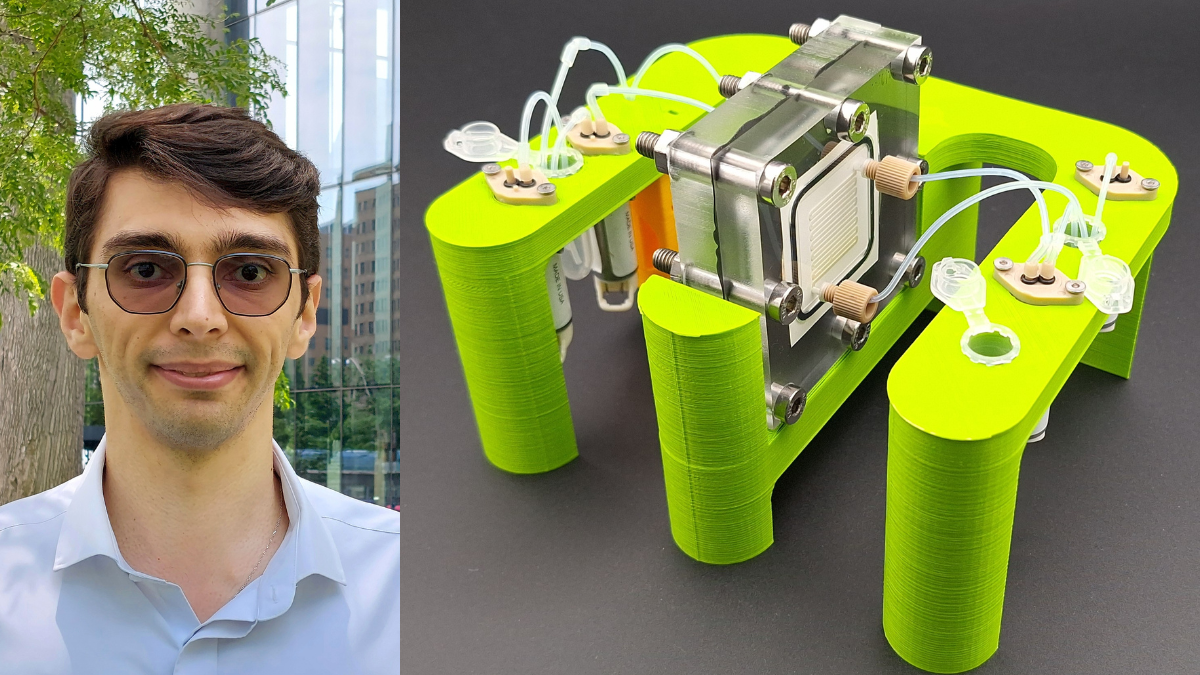Mohammad Simchi is developing a computer-sized automated device (shown right) that can make vaccines at the point-of-need.
September 9, 2024
By Betty Zou
An innovative and cross-disciplinary project aimed at tackling the challenges of global vaccine distribution is getting a jumpstart thanks to new funding from the Emerging and Pandemic Infections Consortium.
The project is led by Mohammad Simchi, a postdoctoral fellow at the University of Toronto’s Leslie Dan Faculty of Pharmacy and the inaugural recipient of the Pfizer Canada EPIC Convergence Postdoctoral Fellowship in Vaccinology.
Established through a generous gift from Pfizer Canada, the fellowship will support Simchi’s efforts to create a portable, automated device to decentralize vaccine production.
“Many vaccines are produced in developed countries and rely on cold supply chains to be distributed, but these supply chains don’t exist in many developing countries or are very costly,” says Simchi, who is jointly supervised by Keith Pardee, an associate professor of pharmacy, and David Sinton, a professor of mechanical and industrial engineering at U of T’s Faculty of Applied Science and Engineering.
To get around these logistical challenges, Simchi’s device relies on a process called cell-free biosynthesis which has been pioneered by Pardee’s lab. A major advantage of this system is that all the parts needed to make proteins — enzymes, amino acid building blocks, DNA templates — can be freeze dried into a powder and shipped at room temperature. To start making proteins for a vaccine, the user simply adds the powdered ingredients to the computer-sized device along with a rehydration solution and presses a button.
While the first versions of the device were successful in generating the vaccine components, the final product was not pure enough and the yield was too low. Using the engineering skills he gained as a PhD student in Sinton’s lab, Simchi developed a second-generation device that uses automation to significantly boost both the purity and amount of vaccines produced.
“My device automates the whole process of synthesis, purification and transfer to [the final] injection buffer,” he says. “Automation allows the reaction to keep going for a longer time so that we have more protein, which means more vaccines to immunize more people.”
The key advantages of Simchi’s device are that it is easy to operate — users do not need highly specialized training — and can be deployed in low resource settings where access to vaccines is often most needed and most limited. It is also adaptable. When new DNA templates are added to the reaction mix, the device can start producing vaccines against a different bacteria or virus.
By allowing users to make the vaccines they need when and where they need it, this cutting-edge technology empowers local health care systems to respond to outbreaks of new or re-emerging infectious diseases more quickly and effectively.
As a proof of principle, Simchi used his device to create a vaccine against SARS-CoV-2 that generated a strong antibody response in mice. He and his colleagues are now using it to create vaccines against Ebola virus and Crimean-Congo haemorrhagic fever virus, two high-risk pathogens that typically affect people living in the global south.
“When we develop a technology, it’s very important to remember that engineers and scientists are not going to be the main users. It’s going to be mostly clinicians and other health care professionals,” says Simchi. That’s why he is also teaming up with collaborators in Brazil to test the device in clinical settings in that country and ensure that the technology is easily transferable.
“Pfizer Canada is proud to support the innovative research of Dr. Simchi through the inaugural Pfizer Canada EPIC Convergence Postdoctoral Fellowship in Vaccinology. We are thankful for our collaboration with the University of Toronto Emerging and Pandemic Infections Consortium, and the opportunity to support public health impact through research and development in the field of vaccinology,” says Ana Gabriela Grajales, primary care medical lead for Pfizer Canada.
The Pfizer Canada EPIC Convergence Postdoctoral Fellowship in Vaccinology was awarded as part of EPIC’s Convergence Postdoctoral Fellowship program. Each fellowship provides $120,000 in funding support over two years to a postdoctoral fellow who is driving an innovative project that bridges two research disciplines.
“There is tremendous value in having diverse perspectives and expertise at the table as we tackle the complex infectious disease challenges facing us today,” says Scott Gray-Owen, EPIC’s academic director and professor of molecular genetics at U of T’s Temerty Faculty of Medicine.
“Congratulations to all the recipients of this year’s EPIC Convergence Postdoctoral Fellowships. Their work showcases not only the breadth and connectedness of our research community, but also the potential impacts we can have when we collaborate across disciplines.”
In addition to Simchi, three postdoctoral researchers received a 2024 EPIC Convergence Postdoctoral Fellowship:
- Guillaume Dugied (co-supervised by Mikko Taipale and Laurence Pelletier)
- Project title: Identification of pathogenic effectors inducing cellular morphological changes
- Amin Ektesabi (co-supervised by Claudia dos Santos and Gilbert Walker)
- Project title: Creation of precision miRNA-based therapy for SARS-CoV-2-induced cardiac dysfunction
- Conrad Izydorczyk (co-supervised by Allison McGeer and Julianne Kus)
- Project title: Antifungal resistance and epidemiology of InvaSivE infections due to non-albicans Candida species (ARISE)
For more information about the funded projects, please visit our website.


